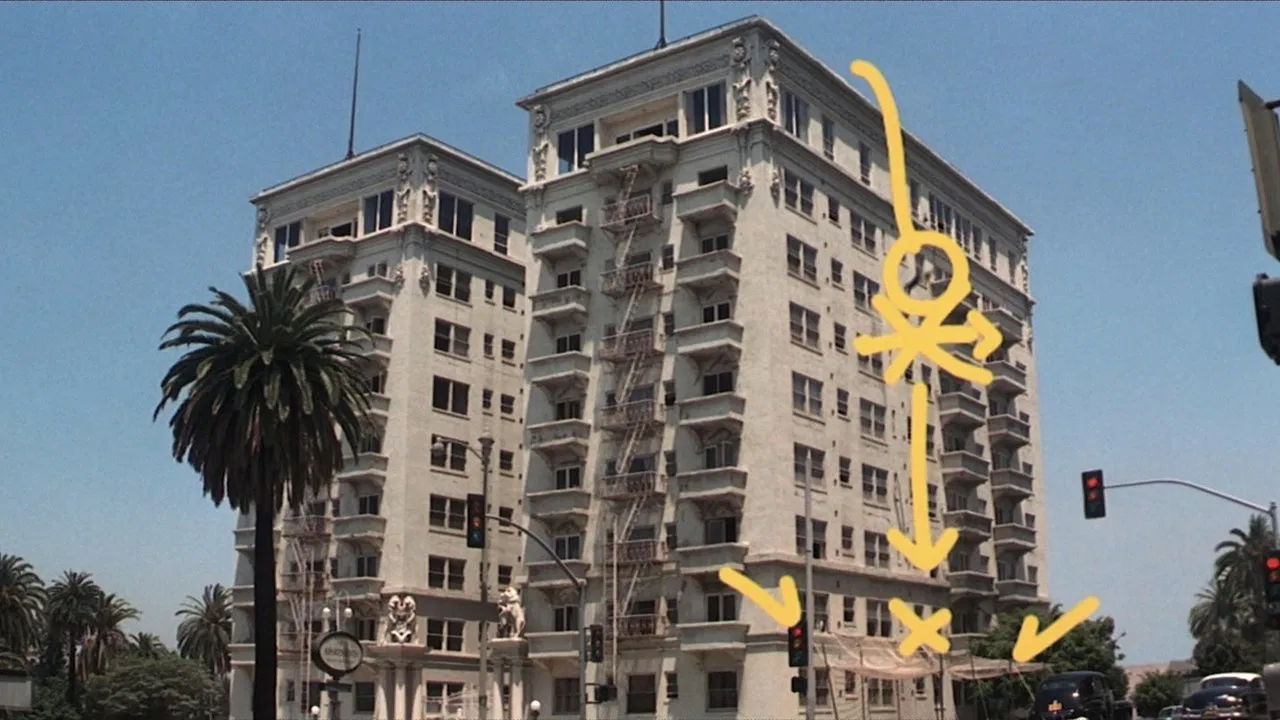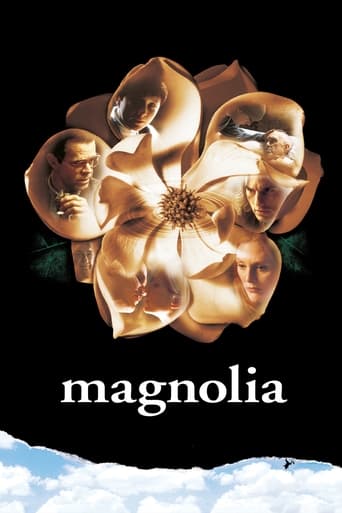

What's there to express? Everything i thought of writing down here had been said by the director. That ending smile from Claudia (Melora walters) is what the director want to show you through the movie and i am telling you that smile defined it all and perfectly delivered the message.A fine masterpiece that showed the love in hate, addiction in depression, hypocrite happiness, past regrets .Believe me these strange things happen all the time and not alone in this movie(as expressed by the director) Then what and who will save this world amidst of all these primal emotions? Love and forgiveness are the key elements.The actors delivered a fine performance and Melora walters, Tom cruise surely deserved an oscar. The imporatnt part you want to notice is many people think that life is short and they do all kinda things but u know what life is? too long that the past sins will squeeze u and make u squeal and all ur repentance and regret won't make the pain go easy and when u realize and make ur decision of leading a nice life u are already a goner.So think before u sin as life gets real short after ur repentance and u will end up thinking that u have wasted ur whole life.Sad demise is not a perfect ending for any good movie or life,so i wish u all the very best with ur life.
... View MoreMagnolia is a very long and complex movie. It contains many themes and issues but it doesn't explore them with much depth. Magnolia ended without giving any new perspectives on its themes. It did leave me bored and impatient. It's impossible not to think when watching Magnolia, why not tackle half these themes, explore them more thoughtfully, say something, ask some questions, and do it in two hours? There are at least three movies contained in Magnolia. Some of the stories are captivating while others are one-dimensional and weightless. Julianne Moore threatens to sink the whole ship with her soap opera-level portrayal of a drug addict with almost-zero characterization. In stark contrast, the characters played by John C. Riley and Tom Cruise could have been entire movies unto themselves. Multiple characters are set up as "bad people" but then the "twist" is that they were abused as children. But as a movie about child abuse, Magnolia has nothing to say at all. Two characters confess that they cheated on their spouses in long monologues. But is Magnolia about infidelity? I don't think so. Is Magnolia about regret? Yes, it's about that, and guilt, parenting, child abuse, substance abuse, law enforcement and crime, honesty, dating, death and dying, child prodigies, show business, unlikely coincidences, loneliness, it never ends!Magnolia is very intense and melodramatic. I don't think intensity and melodrama are substitutes for pathos and insight. The meta-narrative about coincidences and interconnected lives is self-indulgent and self-congratulatory. Magnolia is only bearably watchable from beginning to end because of a few strong performances and excellent cinematography and editing.Ingmar Bergman apparently like this film. Well, if you want a movie about imperfect fathers, check out Bergman's Wild Strawberries. It's way better, and it doesn't have three music videos in it, and it's not over three hours long.
... View More"Be kind. For everyone you encounter is fighting a hard battle." - SocratesThis movie was an excellent reminder of how everyone can become so self-centered that individuals do not realize wars that are consistently being fought by other individuals. It's not a war between two or more individuals, it's a war with the individual's own nervous system. Anyone who needs a good dose of reality should watch this movie.
... View MoreWriter David Foster Wallace was spot on when he called "Magnolia", "pretentious, hollow and 100% gradschoolish in a bad way".Robert Altman's "Nashville" is what this film really owes its debt to, since it was the first to pioneer the longform, intersecting characters narrative that is tied together by a unifying, traumatic event that all the characters share in somehow.Though I suppose you could say that on a surface level, "Magnolia" is still a closer ripoff of "Short Cuts" (rather than "Nashville") since they both take place in 1990s Los Angeles (as opposed to the 1970s Nashville in the film of that title). Structurally speaking, "Magnolia" is a direct ripoff of these two films. The fact that most fans of Anderson's work don't even realize this just goes to show how most of today's tastes of the so-called film community is built around ignorance of film history. When a fanbase is ignorant of an art's history, it allows charlatans to walk in through the front door and pass themselves off as either original or innovative. The main difference, apart from the showy camera moves in "Magnolia" that call attention to themselves without enhancing the narrative in any substantial way, is the fact that the writing in "Magnolia" features banal, obvious, soap-opera style dialogue that produces over-the-top, two-dimensional characters, whereas "Nashville" and "Short Cuts" feature far more sophisticated and realistic dialogue that develops fully realized characters through their actions, choices and words that are never sophomoric platitudes. Typical examples of Magnolia dialogue include: "Dad, you need to be nicer to me."; "I have so much love to give! I just don't know where to put it!"; "The g-damn regret! Oh, and I'll die. Now I'll die, and I'll tell you what... the biggest regret of my life... I let my love go. What did I do? I'm sixty-five years old. And I'm ashamed."; "I'm sick. I have sickness all around me and you f-ing ask me about my life? 'What's wrong?' Have you seen death in your bed? In your house? Where's your f-ing decency?"; "You listen to me now. You're a good person. You're a good and beautiful person and I won't let you walk out on me. And I won't let you say those things - those things about how stupid you are and this and that. I won't stand for that."; "Respect the c-ck! Tame the c-nt!"; "This isn't funny. This isn't cute. See the way we're looked at? Because I'm not a toy. I'm not a doll."...The entire film is written this way. I'm not kidding you. What is quoted above is just a very small sample. And yet the fans of this film seem to actually embrace and encourage this form of awfulness. They can read the above passages and not even chuckle at how bad it is. Some even claim that this dialogue contains real emotional insights(!?!). You can't quote "Nashville" or "Short Cuts" this way because the dialogue is never trite like this. The characters are built up over the entire course of the nearly 3- hour film, not presented or spelled-out in a melodramatic monologue. Their personalities are shaped by their realistic interactions with others - not just what they say, but what they choose not to say and how they behave in some situations but not in others. Then there is the instance where Anderson further boxes himself into a corner with his dialogue and plotting, and thus can only appeal to cinema fanboys by going "meta" by having Phillip Seymour Hoffman deliver the following lines: "I know this sounds silly, like this is the scene in the movie where the guy's trying to get ahold of the long-lost son, you know, but this is that scene. And I think they have those scenes in movies because they're true, you know? Because they really happen. See, this is the scene in the movie where you help me out."Of course it is indeed silly, and Anderson knows it. But rather than having the writing chops to avoid it, Anderson actually embraces it and hopes that his audience will mistake it for genius. And among his many sycophantic fans desperate to anoint a new "auteur" of their own generation - they have. Which then brings us to the awful acting throughout Magnolia that mistakes rank emotionalism for emotional depth. Has there ever been a more over-the-top performance than Julianne Moore's constant crying, yelling and screeching in this film? I defy you to name one. It substitutes soap-opera-style tragic situations that are simply presented to us with the expectation that we will respond with Pavlovian sympathy, rather than developing these situations in an engrossing way. Fighting terminal illness, infidelity,abandonment, child abuse - all the "tragedy" boxes are check marked here with the expectation that we will sympathize and react accordingly. But this isn't a meaningful exploration of tragedy. Its simply grief porn presented in a manner such that Anderson announces, "aren't I edgy and insightful?" Any fan of Magnolia owes it to themselves to see both the truly pioneering "Nashville" as well as the outstanding "Shot Cuts". Those are examples of real filmmaking rooted in genuinely great dialogue and plot development. The taste of those who love "Magnolia" is simply awful beyond words.
... View More